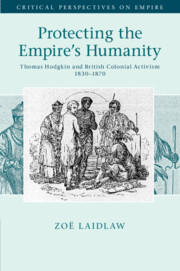Refine search
Actions for selected content:
5 results
10 - Conclusion
- from Part II - Humanitarianism and Settler Colonialism
-
- Book:
- Protecting the Empire's Humanity
- Published online:
- 14 September 2021
- Print publication:
- 23 September 2021, pp 324-333
-
- Chapter
- Export citation
5 - Free Trade versus Free Labour
- from Part I - Mapping Humanitarianism
-
- Book:
- Protecting the Empire's Humanity
- Published online:
- 14 September 2021
- Print publication:
- 23 September 2021, pp 137-172
-
- Chapter
- Export citation
3 - Metropolitan Contexts
- from Part I - Mapping Humanitarianism
-
- Book:
- Protecting the Empire's Humanity
- Published online:
- 14 September 2021
- Print publication:
- 23 September 2021, pp 61-98
-
- Chapter
- Export citation
9 - Betrayal in the Borderlands
- from Part II - Humanitarianism and Settler Colonialism
-
- Book:
- Protecting the Empire's Humanity
- Published online:
- 14 September 2021
- Print publication:
- 23 September 2021, pp 280-323
-
- Chapter
- Export citation

Protecting the Empire's Humanity
- Thomas Hodgkin and British Colonial Activism 1830–1870
-
- Published online:
- 14 September 2021
- Print publication:
- 23 September 2021
